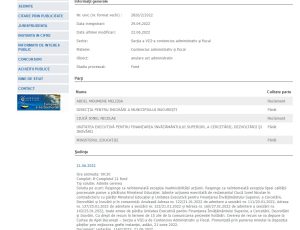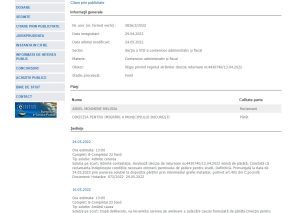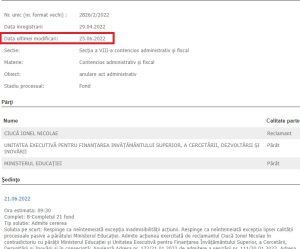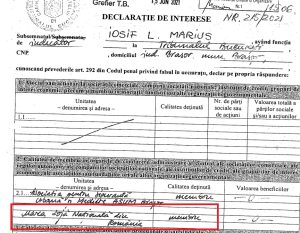
EXCLUSIVE How Prime Minister Nicolae Ciucă’s criminal case was directed by the „cover” method to Judge Marius Iosif, who retired immediately after quashing the plagiarism complaints / Plus: Until last year, Iosif and the government spokesperson were colleagues in the Freemasonry
A slip by an official of the Bucharest Court of Appeal is a strong indication that the file in which Prime Minister Nicolae Ciucă requested the annulment of the plagiarism allegations in his doctoral thesis was „directed” to a specific panel, headed by Judge Marius Iosif, as sources in the judiciary explained to G4Media.ro.
In order for the judgment to end up on Iosif’s desk and to rig the process of random allocation of the case, the „cover” method, known for a long time in the judiciary, was used, the sources also explained.
In the end, Magistrate Iosif handed down the decision Ciucă wanted, a first in jurisprudence. G4Media.ro revealed last week that, in the past, Iosif had been promoted to several government positions by the National Liberal Party (PNL), whose president is currently Nicolae Ciucă himself.
Shortly after the G4Media.ro revelation, Iosif applied to the Superior Council of Magistrates for retirement and was approved. There is another link between the magistrate and the current government of Prime Minister Ciucă, discovered by G4Media.ro: until last year, Marius Iosif and Dan Cărbunaru, the spokesperson of the Executive, appointed by the same Ciucă, were members of the same Masonic Lodge.
After G4Media.ro requested a point of view from the Bucharest Court of Appeal on the indication of manipulation of the random assignment in the Ciucă case, evidence to this effect was deleted from the court portal, and this took place on Saturday 25 June, on a non-working day.
Theoretically, in order to set up a mechanism for rigging the random assignment, the participation of several people is required, which, if proven, would represent an institutional fraud at one of the most prestigious courts in Romania.
G4Media.ro presents – chronologically and showing evidence/captures, as well as the statement of a source in the system – the fact that in the file 2826/2/2022 of the Bucharest Court of Appeal the „cover” method of manipulating the random assignment was used, with the aim that the action filed by Prime Minister Nicolae Ciucă to annul the plagiarism allegations in his doctoral thesis would end up at the exactly at the 21F administrative disputes panel headed by Judge Marius Iosif.
Step 1.
On 29 April 2022, a young Algerian woman named Melissa Abdel Moumene filed an action with the Bucharest Court of Appeal against the Immigration Directorate. On April 13, Moumene, who is studying in Romania, had received a decision to return to her home country and considered the decision to be unlawful, so she challenged it in court.
Initially, Moumene’s case would have been randomly assigned to Marius Iosif’s 21F panel. Shortly afterward, on the desk of the duty clerk/judge at the Bucharest Court of Appeal who assigns the files, arrives the file where Nicolae Ionel Ciucă called the Ministry of Education and the Executive Unit for the Financing of Higher Education, Research, Development and Innovation to the bar, requesting the annulment of the complaints of plagiarism for his doctoral thesis, complaints submitted in January 2022 to the latter institution (subordinate to the Ministry).
This is where the first stage in the application of the „cover” takes place: the names of Nicolae Ionel Ciucă, the Ministry of Education and the Executive Unit for the Financing of Higher Education, Research, Development, and Innovation have been included as parties to the same case immediately below those of Melissa Abdel Moumene and the Directorate General for Immigration, the same file that has already been assigned to Iosif. It is worth noting that both Moumene’s and Ciucă’s files were on the same subject: „annulment of an administrative act” – photo below.

Step 2
However, because Moumene’s case was supposed to be a separate file, the clerk at the Bucharest Court of Appeal subsequently re-allocated it, giving it number 2836/2/2022. This case was settled on 24 May 2022, by another panel – Panel 22 Fond, as can be seen in the picture below.

In order for everything to appear legitimate, and for any trace of this manipulation to be excluded from the system, Melissa Abdel Moumene and Immigration Directorate should have been deleted from file 2826/2/2022. This did not happen: the two were listed as parties even on the 21st of June 2022, when the ruling took place.
Normally in a case, in the minutes of the judgment, there should be references to all parties to the action: this was not the case for case number 2826/2/2022: no mention of Moumene and the Immigration Directorate.
After G4Media.ro published a report in which, among other things, we raised questions about the strange presence of the two parties in Ciucă’s case, a source at the Bucharest Court of Appeal informed us that this betrays the use of the „file cover” method in the process of randomly allocating the case, the aim being that the case reaches „the right people”.
The G4Media.ro source said: „So they needed a „shell” (cover) of a file assigned to the right person (in this case Iosif). On 29.04 Iosif was assigned Moumene’s file no. 2826. At the registry, the name of the complainant is initially entered on the cover page (the first if there are several), precisely to avoid mix-ups, and the rest of the data is filled in later (so as not to hold up the registration of files). Since they needed a „cover page”/ file with a number assigned to Iosif, they subsequently did not fill in the other data in Moumene’s file (defendant, subject) but pasted-in Ciucă. And Moumene was subsequently registered with her immigration file, under a different case file with number 2836, on the same day of course. And I guess they didn’t delete the girl’s name from the initial file number 2826 because when doing periodic checks on random assignment, one of the criteria is to check the list of files with deleted parties.” So traces of deleted parts remain in the system.
Step 3
On 23 June, G4Media.ro sent questions to the Bucharest Court of Appeal about the suspicions in case 2826/2/2022, and on 24 June we called the Press Office saying that we would publish an article about the situation on Monday 27 June and would like to receive a point of view by then.
According to the court portal, on Saturday 25 June, a non-working day, someone at the Bucharest Court of Appeal logged in and removed Melissa Abdel Moumene’s name and that of the Immigration Directorate from the list of parties. Both the events of 29 April, when files 2826/2/2022 and 2836/2/2022 were registered, and the deletion on 25 June indicate the possible involvement of several people in the application of the „cover ” method – duty judge, court clerks or people operating the computer system.

It should be noted that, before the start of the trial, G4Media.ro sent a request to the Bucharest Court of Appeal asking for an electronic copy of the lawsuit filed by Ciucă in case 2826/2/2022. Everything indicated that the request should be admitted: Ciucă is a public figure and he challenges public documents – plagiarism complaints are accessible to anyone, in pdf format, on the National Council for Accreditation of University Degrees, Diplomas and Certificates CNATDCU website. It is of maximum public interest for Romanians to see Ciucă’s arguments in support of the thesis that the plagiarism complaints are not correctly drafted, as this subject is widely debated in the public arena.
The defendants were also two public institutions: the Ministry of Education and the Executive Unit for the Financing of Higher Education, Research, Development and Innovation. According to the provisions, the consent for the transmission of a copy following the proceedings is given by the judge in the case, in this case, Marius Iosif. Unexpectedly, he refused access to the case, without giving any reason.
We asked the Court of Appeal and Iosif, in a Whatsapp message, to explain the refusal, but to no avail. After the first hearing of the case, on June 7, I reiterated my request to receive a copy of the proceedings: I have still not received a reply. I sent a similar request to Ciucă, through his spokesperson – no reply.
Neither the Executive Unit nor the Ministry of Education has been more successful. This is the first case in which a person accused of plagiarism has challenged the legality of the plagiarism complaints submitted to the Executive Unit/CNATDCU and obtained their annulment.
The Bucharest Court of Appeal has been headed since 2019 by Luminița Criștiu Ninu, a judge close to Lia Savonea, an influential member of the Superior Council of Magistrates, who has been repeatedly described in the central press as the leader of an anti-reformist camp in the judiciary.
The ” file cover ” method of rigging random assignment has been talked about for a long time in the Romanian justice system, and there are cases in which it has come to the attention of the Judicial Inspectorate – the institution designed to investigate such misconduct.
In 2013, the Inspectorate sent to the Superior Council of Magistracy the results of an inspection on this issue, one of the conclusions of the Report being that „No situations of bias in the random allocation of cases were identified by the court managements, but some vulnerabilities of the random allocation system were reported, and the issues presented are of particular importance as they come from the persons responsible or actually performing the random allocation activity.”
Subsequent to this Report, prosecutors from the National Anticorruption Directorate (DNA) discovered that a judge at the Bucharest Court had manipulated the random allocation in two cases, in one of which she was assisted by a court clerk. The offenses took place in 2011 and 2012.
G4Media.ro revealed last week that between 2007 and 2008, Judge Marius Iosif, who at the time worked in the Brașov Court, was imposed in several government positions by Tudor Chiuariu, the PNL Minister of Justice: director of the Directorate of Analysis and Approval of Normative Acts in the ministry, director-general of the National Administration of the Penitentiaries, president of the Justice Secret Service SIPA archive inventory commission.
In the article, I raised the issue of Iosif’s potential lack of objectivity in judging of the Ciucă case, currently president of the same party – PNL. Subsequently, I discovered another possible link between Ciucă and Iosif: the government spokesperson, Dan Cărbunaru.
Cărbunaru was appointed to this position by Ciucă and was, until last year, Iosif’s colleague in The National Grand Lodge of Romania. Cărbunaru was also the spokesperson of the Lodge for about 10 years.

„(…) I did not make any contact, I did not have any discussion about the topic you are referring to, nor do I remember having met the person in question,” Cărbunaru told G4Media.ro, while Iosif, as in previous situations, did not respond to questions sent on Whatsapp or to a phone call.
It should be noted that the Minister of Education, Sorin Câmpeanu, is also a member of the same Masonic Lodge. In case 2826/2/2022, his institution tried to get rid of any involvement and pleaded lack of standing, which the judge rejected.
G4Media.ro also discovered last week that shortly after we revealed his ties to the PNL, Iosif submitted an application for retirement to the Superior Council of Magistrates, which was approved for him as of 1 August 2022.
Regarding this case, the Judicial Inspectorate has told G4Media.ro that this body „cannot issue opinions outside the legal framework”, represented by formal and reasoned referrals. The Inspectorate does, however, have the possibility to make a self-report, but the Inspectorate’s address does not contain information on whether the Chief Inspector has taken such a decision.
The Superior Council of Magistracy said that the subject of G4Media.ro’s request „exceeds the competencies” of this institution. The Bucharest Court of Appeal did not respond to questions about possible manipulation of the random allocation system in case 2826/2/2022.
The controversy surrounding Prime Minister Ciucă’s doctoral thesis began in January 2022, after journalist Emilia Șercan presented multiple pieces of evidence on the website pressone.ro showing that a large part of the work, defended in 2003 at the National Defence University „Carol I”, was plagiarised.
After this point, several suspicious moments occurred, which outline the existence of an intention to delay/mislead the analysis of the work, including with the support of some State institutions:
- Ciucă publicly stated that he wanted the thesis to be verified by the Ethics Commission of the University of Defense, although the latter cannot withdraw doctoral degrees
- The General Prosecutor’s Office launched a criminal investigation into the copyright infringement in Ciucă’s thesis and submitted all the documents in this case to the CNATDCU – the only institution authorized, at that time, to propose the withdrawal of a doctoral degree. The CNATDCU had received the plagiarism complaints from the Executive Unit, according to the procedure
- Journalist Emilia Șercan accused that she had been the target of a discrediting campaign, in which the Romanian Police and the Ministry of Internal Affairs were involved;
- Two Bucharest Court of Appeal panels suspended and then annulled the effects of the registration of plagiarism complaints, as they were forms with fixed headings, in which the complainants had to mention their names, other personal data, evidence/links in support of the accusations. In the Ciucă case, the Executive Unit, which has the role of registrar (the punctual analysis is the responsibility of the CNATDCU), received, after Șercan’s revelations, nine complaints, admitting only three – those canceled on 21 June 2022 by Iosif. If Iosif’s decision remains final, the CNATDCU will no longer have a Ciucă case pending. Even if, in a hypothetical scenario, the High Court of Cassation and Justice accepts the possible appeal by the Ministry and the Executive Unit, this will take place long after the Prime Minister respects the agreement with the PSD and steps down accordingly and, in May 2023, hands over this portfolio to the PSD. Thus, if Iosif motivates the decision from 21 June until his retirement date, the Ministry and the Unit will have until August 2022 to file an appeal. According to the High Court’s portal, for a case that reaches the chamber responsible for cases like Ciucă, the first deadline is at least one year away; in the case of 2826/2/2022 – August 2023;
- In the situation of the case in which Ciucă initially obtained, on 1 March 2022, the suspension of the effects of the registration of the referrals, the reasoning is still not drafted, almost 4 months after the ruling. A former member of the Superior Council of Magistracy noted on 4 April that this was the only unmotivated case on the list of those being heard in the panel where Ciucă’s case was on the table. The trial also took place at the Bucharest Court of Appeal, with Ionela Tudor as a magistrate. The lack of reasoning prevents the Executive Unit and the Ministry of Education from filing an appeal.
Only on the 27 of June, at 14.06, the Bucharest Court of Appeal told G4Media.ro that the decision in the case delivered on 1 March has been drafted and will be sent to us on Tuesday, 28 June, by e-mail and that the reiteration of the request to study the file 2826/2/2022 has been approved, and that we will be contacted to come to the archives of the Bucharest Court of Appeal for this purpose.
Traducerea Ovidiu Harfaș
Urmărește mai jos producțiile video ale G4Media:

Donează lunar pentru susținerea proiectului G4Media
Donează suma dorită pentru susținerea proiectului G4Media
CONT LEI: RO89RZBR0000060019874867
Deschis la Raiffeisen Bank
1 comentariu